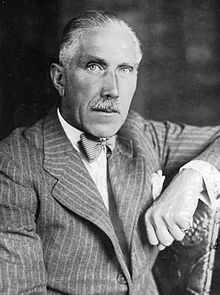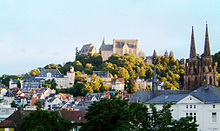- Marburg speech
-
 Catholic politician Franz von Papen called for an end of Nazi terror and a return to freedom and dignity
Catholic politician Franz von Papen called for an end of Nazi terror and a return to freedom and dignity
The Marburg speech (German: Marburger Rede) was an address given by German vice chancellor Franz von Papen at the University of Marburg on June 17, 1934. It is said to be the last speech made publicly, and on a high level, in Germany against Nazism.
Papen, encouraged by President Paul von Hindenburg, spoke out publicly about the excesses of the Nazi regime, whose ascent to power, 17 months earlier when Adolf Hitler became chancellor of Germany, had been assisted measurably by Papen. In his speech von Papen called for an end of the Nazi terror and the clamoring for a "second revolution" by the Sturmabteilung (SA – the Nazi Party storm troopers), and a return to dignity and freedom. He also stated: "The government [must be] mindful of the old maxim 'only weaklings suffer no criticism'".
The speech was drafted by one of Papen's close advisors, Edgar Julius Jung, with additional assistance by Papen's secretary Herbert von Bose and by Erich Klausener. It was delivered in the Landgrafenhaus, the 1920s neo-rococo classroom building of the university, in the main lecture hall. The hall is still there today, including the original furniture (Room 101 of what is now one of the two buildings of the Law School), but there is no plaque or any other form of commemoration of the Papen speech.
The speech made Hitler furious, and propaganda minister Joseph Goebbels attempted to suppress it. Angered by the blocking of publication of his speech, Papen insisted he had spoken on behalf of Hindenburg, threatened to submit his resignation from Hitler's cabinet, and promised to inform Hindenburg of the suppression of his speech.
Two weeks later, on the Night of the Long Knives, the SS and Gestapo murdered Hitler's enemies within the Nazi Party, as well as various past friends and associates to whom his relationship might prove awkward, and several conservative opponents of Nazism. During this blood purge Jung, von Bose, and Klausener were also killed. Papen's office was ransacked and he was himself held under house arrest, but his life was spared. Papen's resignation as vice chancellor was accepted after the purge was over. Papen would later serve as a diplomat until 1944, and played no further political role.
Literature
- "Rede des Vizekanzlers von Papen vor dem Universitätsbund, Marburg, am 17 Juni 1934", in: Edmund Forschbach: Edgar J. Jung. Ein konservativer Revolutionär 30. Juni 1934, 1984, p. 154ff.
- "Rede des Vizekanzlers von Papen vor dem Universitätsbund, Marburg, am 17 Juni 1934", in: Sebastian Maaß: Die andere deutsche Revolution. Edgar Julius Jung und die metaphysischen Grundlagen der Konservativen Revolution, 2009, p. 134ff.
- "Vice-Chancellor Franz von Papen's Marburg Speech: A Call for More Freedom, June 17, 1934" (English-language translation), in: Louis L. Snyder, editor: Hitler's Third Reich; A Documentary History, Chicago: Nelson-Hall, 1981. pp.173-177.
External links
- German text of the Marburg speech (German)
Categories:- Nazi Germany
- Speeches
- Marburg
- German history stubs
Wikimedia Foundation. 2010.

